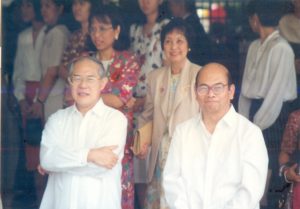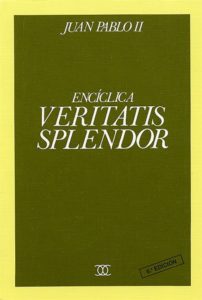This article first appeared in the March 1996 issue of Universitas.
The institutional calendar of the University of Asia and the Pacific (UA&P) celebrates four thrusts corresponding to the four quarters of each year. The first quarter focuses on values formation; the second quarter on people development; the third on research and communication; and the fourth on the integration of the first three. These four thrusts reinforce the tradition of excellence the University has started since its inception as the Center for Research and Communication in 1968.
The first University Values Formation Day was held on February 28, 1996 at the Celestino Dizon Auditorium. It was attended by the staff of the UA&P Graduate Schools and the College of Arts and Sciences, as well as friends of UA&P President Dr. Jesus Estanislao, superintendents of the the Department of Education, Culture, and Sports, and students of the Applied Business Economics Program, Industrial Economics Program, Strategic Business Economics Program, and Master of Arts in Values Education.

UA&P founders Dr. Jesus P. Estanislao and Dr. Bernardo M. Villegas in 1995.
In his lecture entitled “Universality of Values: Nondichotomy between East and West,” Dr. Paul Dumol, UA&P Vice President for Academic Affairs, stressed that values are universal in the sense that any human being, regardless of culture or historical period, may acquire any value already possessed by other human beings from other cultures or historical periods. He said:
Do the terms “Eastern values” or “Western values” make sense? When an idea of happiness is shared by a significant number of people who form part of the same society, one could speak of that society’s values. That is, I take it, the sense in which we refer to the materialistic or consumerist values of the West. “Eastern values” and “Western values” in effect refer to the values of a society at large, rooted in a generalized idea of happiness. There is another sense in which these terms may be taken, and that is as the understanding one society has of another’s values. Thus, Orientals may refer to the values promoted by Hollywood movies and television programs as “Western” values, even if, if we are to believe the film critic Michael Medved, the vast majority of Americans do not share those values: “Western” in this case simply means the place of origin of certain values. There is a third way in which one may speak of a society’s values, and this is in reference to the values promoted by the institutions of that society, regardless of the way the majority in that society think. That, I believe, is what the present Pope refers to in his ‘Gospel of Life’, the tyranny of the minority who with their political influence and money manage to get law passed with which the majority are in disagreement. Of these three ways of understanding the phrase “a society’s values,” clearly it is only the first that does justice to the the phrase: not the values we think a society holds on the basis of MTV videos or on the basis of the laws promulgated there, but rather the values the majority in that society actually hold. And what that is in either East or West is a nebulous question. To talk of a dichotomy between Eastern and Western values in such a case is simply out of place.
Dr. Dumol also said that Christianity has given rise to values unknown before. He pointed out: “Christianity is the great Unpredicted and has promoted values that did not exist in millenniums past. In a similar way, rebellions against Christianity , which I believe we are witnessing in the West today, have given rise to perversities we have no record of in past cultures. Consider the perversions of freedom described by the Pope in Veritatis Splendor.” He concluded his lecture with an invitation for everyone to read about the miseries and glories of contemporary man in Veritatis Splendor (The Splendor of Truth).

Entertainment followed Dr. Dumol’s lecture. Jim San Juan sang Panawagan, a musical piece which won second prize in the DBP Composition Competition. The composer, Syrell P. Ramos, a commerce student at Adamson University, thinks that self-discipline is the most essential value that Filipinos should practice if the country is to attain progress. The song supports its composer’s aim to kick off a “self-discipline crusade” through the promotion of nationalism. Panawagan is a call for the youth to reexamine their values and reflect on the efforts of Filipino heroes who fought for the country’s independence.
Another major part of the program was the distribution of citations to persons who have contributed individual and institutional efforts to the building of a National Culture of Excellence. The awardees were:
- Ms. Lourdes C. Romero – Superintendent, Department of Education, Culture, and Sports, Region 3, Division of Pampanga
- Dr. Roque L. Carballo – Director, Institute for Ethics and Excellence in Enterprise, University of Asia and the Pacific
- Dr. Nilo L. Rosas – Director, Department of Education, Culture, and Sports, National Capital Region
- Mr. Alfredo Antonio – Chairman, Development Bank of the Philippines
- Mr. Roberto D. Anonas – President and Chief Executive Officer, Bank of Commerce
Ms. Diana Santos, Principal of Rizal High School, delivered a testimony on the possibility of adopting the National Culture of Excellence in a school environment, discussing her experiences with the NCE program in her school, reputedly the biggest high school in the world (with an estimated 19,000 students).

Ms. Diana Santos spoke in a reunion of Rizal High School alumni in 2002. Photo from Angelfire.
The audience was then delighted by the first prize-winning song in the DBP Composition Competition. Antonimar Balila, a deputy assistant at the Muntinlupa Center for Culture and Arts (an umbrella organization of visual, performing, and literary artists), performed his own composition, Paggalang.
Putting more emphasis on the lyrics than on the melody, the singer-composer considers music an information tool. Paggalang, which was created at the height of typhoon Rosing, encourages the youth to revive the virtue of respect for their elders.
Finally, Dr. Jesus P. Estanislao, UA&P President, reiterated the University’s commitment to the promotion of the National Culture of Excellence in 1996.
Leave a Reply